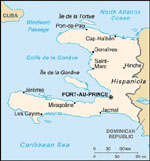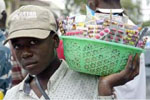|
|

|
Global Health
Invisible powers: Haitian life, culture
|
Editor's
note: Welcome to the Global Health page. The purpose of this feature is
to raise awareness of global health issues with an academic spirit to
help improve the quality of care provided to patients. E-mail
globalhealthnews@musc.edu.
by Andrea P. Summer, M.D.
Haiti is the poorest country in the Western Hemisphere with an
estimated 80 percent of the population living below the poverty line.
The dismal economic situation in Haiti stems from limited
infrastructure, devastation from repeated natural disasters, high
inflation, a marked trade deficit, and lack of investment from
wealthier nations due to security concerns.
Furthermore, the recent abrupt rise in global food prices and ravaging
hurricanes have led to an increased prevalence of malnutrition and
expanded instability. Pharmacy student, Jean Hilaire, discusses reasons
for the ongoing health care delivery crisis in Haiti and describes
commonly used traditional healing practices.
 Haiti facts Haiti facts
The Republic of Haiti shares the island of Hispaniola with the Dominican Republic.
The official languages of Haiti are Haitian Creole and French.
Haiti, Afghanistan and Somalia ranks as the world's worst daily caloric deficit per inhabitant.
Diarrheal illness is the second leading cause of death in the general population in Haiti.
80 percent of Haitians are Catholic, but at least 50 percent practice voodoo, as well.
Announcements
The Global and Tropical Medicine Group will present Jeff Deal, M.D.,
who will speak about his outreach in Sudan at 6 p.m. Nov. 13 in
the Storm Eye Institute Auditorium. All are welcome to attend.
Upcoming MUSC International Programs
USS Yorktown tour, 1 p.m. Nov. 9
Thanksgiving dinner, 6 - 8 p.m. Nov. 20
Hope Lodge International Bake Sale (details to follow)
Information for all international programs and events can be found at http://www.musc.edu/international.
Clinician’s corner
Protein-energy malnutrition (PEM) is a major factor in what percentage of deaths among young children globally?
A. Less than 10 percent B. 20 to 30 percent
C. At least 50 percent D. More than 80 percent
The correct answer is C.
Protein-energy malnutrition (PEM) plays a major role in at least 50
percent of deaths among young children worldwide, usually in
conjunction with serious infection. The term PEM represents a range
that includes severe forms of malnutrition such as kwashiorkor and
marasmus as well as stunting and underweight which reflect more chronic
and milder forms. In Haiti, the prevalence of PEM in children < 5
years of age is estimated to be over 40 percent. Children suffering
from malnutrition often experience devastating effects not only on
their health and growth, but also on their cognitive, motor and social
development.
Folk, voodoo medicine thrives in Haiti
by
Jean
Hilaire
Student, College of Pharmacy
As 9 million Haitians struggle to survive in the wake of a worldwide
financial crisis, they also face another challenge: the country’s
deteriorating health care system. This decline is due to the shortage
of health workers and lack of infrastructure. During the past few
decades, large numbers of skilled health workers fled Haiti in search
of better employment opportunities in Western countries, such as
Canada, France and the United States. A study conducted by the World
Bank in 2007 revealed that 83 percent of Haitian medical doctors live
outside the country. This massive exodus has taken a heavy toll on the
already under-funded and fragile health system in Haiti.
Since most Haitians have limited access to health care, they largely depend on home remedies, folk healers or voodoo medicine.
When someone in the family becomes ill, the mother or grandmother is
often responsible for diagnosing symptoms and keeping alive the
traditions of the family in treating sickness. The following home
remedies may be used: a tea of lila leaves for fevers; cachima leaf tea
for abdominal pain from overeating; a tea of bazilic for cough or
fever.
Diarrhea may be treated by oral rehydration solution, ampicillin
or tetracycline mixed with lemon, or soup with vegetables. Lemon juice
or antibiotic powder is applied directly into lacerations. It is
customary in Haiti to purchase antibiotics, vitamins, and pain
medicines from market and street vendors exclaiming the wonders of the
medicines they have for sale. Sometimes packets of medicines are sold
without dosage information or expiration dates which can be very
harmful to one’s health.
 A boy sells medicines in the street in Port-de-Paix, Haiti. A boy sells medicines in the street in Port-de-Paix, Haiti.
The voodoo folk healer is a priest who has studied the mythology of
spirits and determined plants that have properties for home remedies.
Treatment involves prayers and herbal remedies. Haitians from rural
areas believe that illness can be of natural or supernatural origins.
Natural illnesses are called malady pei (country diseases) or malady
bon die (diseases of the Lord) and last for only a short time.
Supernatural illnesses appear suddenly with no preceding signs. Angry
voodoo spirits are believed to cause several types of illness, which
occur when a person offends the family’s voodoo spirit protector. A
voodoo priest is consulted to help with diagnosing and treating the
illness.
Friday, Oct. 31, 2008
|
|
|



 Haiti facts
Haiti facts